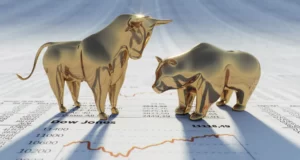Stocks rose Tuesday following a brutal week as investors assessed a more aggressive Federal Reserve and rising chances of a recession.
The Dow Jones Industrial Average jumped 424 points or 1.4%. The S&P 500 climbed 1.9%, and the Nasdaq Composite popped 2.3%. U.S. stock markets were closed Monday for Juneteenth.
Those moves follow last week’s declines that saw the S&P 500 post its worst week since 2020. Many investors fear that a bounce amid growing fears of a recession may be short-lived, though others expect that markets have more accurately priced in inflationary pressures.
“There’s not a single reason for the bounce in equities, and the overwhelming view is dismissing the uptick as being nothing more than a dead cat, something that should be faded just like all the other rally attempts lately. We push back a little bit on that view, largely because of an approaching inflation shift,” wrote Adam Crisafulli of Vital Knowledge.
Crisafulli noted that Brent crude was trading roughly $10 below a recent high, while President Joe Biden gets set for a trip to Saudi Arabia to discuss energy production. He also pointed out that iron ore and copper have fallen recently.
“If commodities can stay on a downward trajectory, it would remove a massive overhang from equity markets,” he said.
Brent crude futures traded 1.4% higher at $115.75 per barrel. West Texas Intermediate, the U.S. oil benchmark, gained 2.2% to $110.41 per barrel.
Major tech stocks moved higher. Shares of Apple, Amazon, Google-parent Alphabet, and Meta all climbed more than 1%.
Shares of Kellogg jumped more than 5% after the company said it would split into three separate companies.
Airline stocks soared amid hopes of a summer travel boom. Shares of Spirit Airlines jumped more than 8% after JetBlue raised its takeover offer to $33.50 a share, even as Spirit deliberates a proposed merger with Frontier Group. JetBlue’s stock price jumped 1.4%.
Meanwhile, the yield on the benchmark 10-year Treasury note continued to march higher. Yields move inversely to prices.
The major averages suffered their 10th losing week in 11 last week on fears that the central bank will hike rates aggressively to tame inflation at the risk of causing an economic downturn. The S&P 500 dropped 5.8% last week for its biggest weekly loss since March 2020, dipping deeper into bear market territory. The equity benchmark is now more than 23% off its record high from early January.
The blue-chip Dow slid 4.8% last week, dipping below 30,000 for the first time since January 2021 last week. The tech-heavy Nasdaq Composite slipped 4.8% last week.
The steep drop in equities appeared to signify the further weakening in investor confidence in the economic outlook and the Federal Reserve’s ability to navigate a soft landing. Some on Wall Street say that earnings estimates may be the next to fall given the rising probability of an imminent recession.
“Even in the event of recession is avoided, the earnings numbers are too high because the inflationary pressure on costs is now squeezing margins, meaning our fire and ice narrative really is playing out to a tee, and we’ve priced a lot of it,” Mike Wilson, chief U.S. equity strategist at Morgan Stanley, said on CNBC’s “Squawk Box” on Tuesday. “We just haven’t priced it fully for the recessionary outcome.”
Fed Chair Jerome Powell will testify before Congress Wednesday and Thursday. His appearance comes after a recent rate hike by three-quarters of a percentage point, the central bank’s biggest increase since 1994.
Investors will monitor incoming data, including existing home sales on Tuesday, to gauge the health of the economy. Recent data showing low consumer confidence, falling retail spending and a cooling housing market have fueled recession fears as the Fed battles inflation at 41-year highs.
Meanwhile, cryptocurrencies continued their roller-coaster ride. Bitcoin fell to a new 2022 low of $17,601.58 over the weekend before climbing back above the $20,000 mark on Monday. The world’s largest cryptocurrency by market cap sits 70% below its all-time high hit in November.

